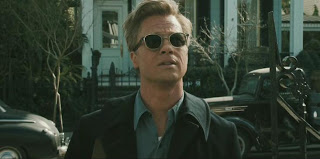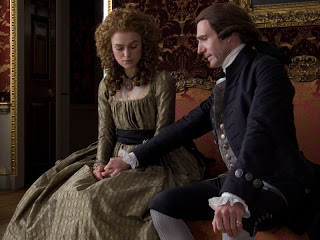NOMINEES
The Curious Case of Benjamin Button – Alexandre Desplat
Defiance – James Newton Howard
Milk – Danny Elfman
Slumdog Millionaire – A.R. Rahman
Wall-E – Thomas Newman
WILL WIN
I’m discounting Defiance immediately, which is a shame because it means poor James Newton Howard will fall to zero-for-eight in his Oscar chances. The veteran is one of the most reliable and prolific film composers around – in the last two years alone he’s scored 10 feature films, most notably the stunningly beautiful cues for I Am Legend – but Defiance just doesn’t have any traction (Howard’s nod constitutes the movie’s lone nomination). He’ll get his due someday, although likely not for his work on Confessions of a Shopaholic.
In spite of Milk’s best picture nomination, Danny Elfman’s score is hardly Oscar-worthy, so he’s out. As for Wall-E, conventional wisdom suggests eliminating it because it doesn’t have a Best Picture nomination; each of the past five winners of the award was also in contention for the top prize (though oddly enough, only one – The Lord of the Rings: The Return of the King – actually won Best Picture). Still, I don’t think Thomas Newman’s score can be dismissed out-of-hand, partly because Peter Gabriel’s “Down to Earth” might grant it some attention, partly because he’s emerging as a household name in the industry. No longer just Randy Newman’s cousin, Thomas Newman has now received nine nominations for Best Original Score – like James Newton Howard, he’s never once won. If Randy was able to bully the Academy into breaking his 0-15 Oscar streak and scoring a statuette for the dreadful “If I Didn’t Have You” from Monsters Inc., could Thomas do the same for his score for Wall-E?
Possibly, but I doubt it, primarily because the score itself is too light-hearted and whimsical to gain Oscar gold. Voters tend to favor either the somber or the epic in choosing their favorite scores, and Newman’s music for Wall-E is neither.
Now, A.R. Rahman’s score for Slumdog Millionaire is itself neither somber nor epic – it’s primarily electronic and features driving, forceful compositions rather than soaring themes or delicate melodies. It is precisely the kind of score that never would have earned the Academy’s honor in the past. In contrast, Alexandre Desplat’s music for The Curious Case of Benjamin Button is everything a classical Oscar candidate should be – graceful, piano-driven, and generally lovely.
Which is why I was all set to predict Benjamin Button to win. Then I looked at the data. Slumdog Millionaire has been dominant thus far, claiming victory at both the BAFTAs and the Golden Globes, as well as the Broadcast Film Critics Awards; those are three big-time events leading up to the Oscars. Benjamin Button, for its part, has won twice – in Phoenix and Central Ohio. No offense to either of those cities, but they aren’t exactly resplendent in cinematic prestige. As such, Slumdog Millionaire is the obvious choice.
But you know what? Fuck it. I need to distinguish myself with a few upset picks at some point, and this is probably as good a chance as I’m going to get. The Curious Case of Benjamin Button takes this one.
SHOULD WIN
Evaluating movie scores is a tricky business. It can essentially be done in one of two ways. The first is to determine how successful the music is in the course of the film in elucidating its themes and propelling its narrative. While this is perhaps the preferable, more appropriate method, it’s also more challenging – it’s often difficult to reflect on a movie and recall the precise effect the music had on the proceedings. (Dario Marianelli’s score for Atonement last year serves as a prominent exception to this rule, as does Jonny Greenwood’s work for There Will Be Blood, the latter for all the wrong reasons.)
The second method is simply to listen to the music on album. This also used to be challenging, until I entered into a mutually beneficial arrangement with the Academy through which it would send me CDs of the nominated scores in exchange for distribution and copy rights to certain snippets of the Manifesto for use in the Oscar telecast. Or I just downloaded them off the Internet. Either way, 2008 represents the first year where I’ve been able to listen to every nominated score in its entirety, which is gratifying and also bolsters my confidence in selecting a winner in this particular category.
It also makes me wonder just why Milk is nominated. Danny Elfman’s score for Gus Van Sant’s biopic is pleasant, innocuous, and not remotely memorable (except for the jazz-tinged moments, which are memorable only in that they’re obnoxious). I confess that I’ve never been a huge Elfman fan (even if he has worked on some of my favorite movies, including Spider-Man) – he always seems to be striving for a balance between robust, iconic theme music and quirky, original compositions, and the results generally range from boring to schizophrenic. Milk errs toward the former – it isn’t bad music, but it isn’t commendable either (frankly, I preferred Elfman’s work this year on Hellboy II: The Golden Army).
As for Wall-E, Thomas Newman’s score is indeed light and amiable, but I find that strangely disappointing. For a film as thematically rich and (at times) foreboding, I was hoping for a score that plumbed the depths of musical darkness with a bit more courage. Newman starts off this way with “2815 A.D.”, an eerie introductory track that features a lonesome piano backed by ghostly, ominous woodwinds, but he soon reverts to a more playful, bouncy tone. It makes sense, I suppose, in that Wall-E is full of playful moments, but the score lacks dimension. (Note: That’s pretty much the last even marginally negative comment I’m ever going to make about Wall-E.)
Defiance constitutes another noble effort from James Newton Howard, but it possesses neither the elegance nor the clarity of some of his better works. Alexandre Desplat’s score for Benjamin Button, on the other hand, is supple and poetic without the slightest hint of grandstanding. It may not feature any overtly memorable themes, but its gentle melodies keep drawing me back again and again.
Now, Slumdog Millionaire exemplifies the exact duality I referred to earlier, namely that the score in the film and the score on the album are two very different things. Watching the movie, it’s apparent that the music is kickass – percussive, forceful, furiously driving the film forward. Listening to the album, however, I have to wonder how much of that is A.R. Rahman’s music and how much is Danny Boyle’s direction, especially since Rahman is far from the only figure on the album. Three of the first five tracks are dominated by M.I.A., while a fourth – the phenomenal “Aaj Ki Raat”, whose Hindi chorus will infiltrate your head for days – wasn’t composed by Rahman at all. The remaining tracks all feature singing from Indian performers in addition to Rahman’s music, and they vary in both style and effectiveness (Suzanne D’Mello lends ethereal majesty to “Latika’s Theme” and “Dreams on Fire”, but I have no idea what the fuck is going on with “Liquid Dance” or “Gangsta Blues”).
What it really comes down to is the definition of the award. Is the Best Original Score Oscar designed to honor the totality of the music of a motion picture, or should it highlight a specific composer for his singular efforts? I tend to lead toward the latter, and while Slumdog Millionaire features its share of undeniably awesome music, it lacks coherence, feeling more like an inconsistent soundtrack compilation than an actual score. In contrast, Alexandre Desplat’s music for The Curious Case of Benjamin Button is a movie score through and through. Both hopeful and melancholic, it perfectly complements the film’s touching, sad story. Good enough for me.
DESERVING
The Duchess – Rachel Portman. Easily my favorite score of the year, Rachel Portman’s music abounds with stirring, beautiful compositions (only fitting for a film starring such a stirring, beautiful actress). Primarily led by violins but also featuring deep brass, Portman’s work is at once grandly majestic and profoundly intimate. Just lovely.
Valkyrie – John Ottman. Surprisingly delicate given the movie’s clipped style and brisk pace, John Ottman’s music is eloquent and appropriately stately without being grandiose. The inclusion of a German choir on “They’ll Remember You” is a nice touch.
The Dark Knight – Hans Zimmer & James Newton-Howard. I can’t get fully behind this score – it’s too distant and oblique to be fully seductive – but it does feature some spectacular moments. Neither bombastic nor mere background noise, the score – like the film itself – defies the conventions of its genre.
Jeremy Beck is the editor-in-chief of MovieManifesto. He watches more movies and television than he probably should.



